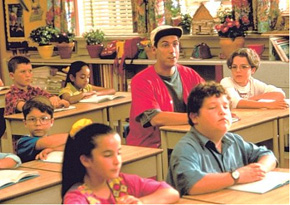 Adam Sandler, in the 1995 movie Billy Madison, must go back to elementary school as as adult to make up the work he avoided as a child. |
The last several days have been difficult ones for the Department of Education, with the abrupt departure of its top educator, Diana Lam. Chancellor Joel Klein's decision to appoint long-time educator Carmen Fariña, the superintendent of school Region 8 in Brooklyn, to replace Lam should calm the storm and get the department back on track. Fariña's direct and immediate knowledge of our city's public schools will provide the consistency that our teachers and students need. No matter how one feels about the many reforms Lam put into place, I think we can all agree that switching gears in the middle of the year would be incredibly disruptive for our schools.
That said, there is a reform that the department needs to seriously rethink before it implements it next month -- the recently proposed third grade promotion policy. You would be hard pressed to find a person in this city without an opinion on the policy. Former Mayor Ed Koch, former U.S. Representative Herman Badillo, and former Schools Chancellor Frank Macchiarola support it. Many academics and advocates fiercely oppose the plan. Others, such as United Federation of Teachers president Randi Weingarten, have offered compelling alternative proposals. The Panel for Educational Policy is slated to vote on the policy on March 15.
Out of the cacophony of comments on the issue, there seems to be one thing we can all agree on: We cannot wait until third grade to address students' academic needs.
Mayor Michael Bloomberg's proposed third grade promotion policy requires that all students who score a Level 1 (the lowest level, indicating the student falls far short of meeting standards) on either the English/language arts or mathematics third grade tests will be held back. According to the proposed policy, the students will receive extra help during a 16-day summer program and during the following school year in order to get them to grade level. As a mother, former teacher and the chair of the City Council's Education Committee, I am greatly concerned that these interventions are too little, too late. If the mayor is serious about ensuring that all students achieve at grade level -- and I believe he is -- he should invest $80 million to $90 million dollars before they fail the third grade tests not after.
Many of the students who will score at Level 1 on the third grade tests to be given in a few weeks have been behind from the moment they entered the public school system. Many never had a day of pre-kindergarten. Many have developmental delays or learning disabilities that have gone undetected. It is tragic and unacceptable that only after failing the upcoming tests will these children get the help they need and deserve. We must do better. Our city needs an aggressive early intervention policy. I propose the following three-point plan:
Full Enrollment in Universal Pre-Kindergarten
In February 2003, the City Council Education Committee released a report that found that the city has failed to provide pre-kindergarten services to tens of thousands of eligible New York children. When the report was released, many in the administration lamented that, although the state provides most of the funding for the program, the city could not afford the financial burden of enrolling additional children. From where I stand, we cannot afford NOT to enroll all eligible students in universal pre-kindergarten. From both a budgetary and an educational point of view, the number of students who go without pre-kindergarten education represents bad public policy. Educators far and wide agree that stepping in to help children before they begin regular classes at age five is less expensive, and more effective, than trying to help the youngsters catch up when they are older.
Kindergarten Plus
With or without universal pre-kindergarten, there will still be children who complete a year of kindergarten and are not ready for first grade. Parents and educators have long known that these children would benefit from a second year of kindergarten. In fact, a second year of kindergarten is common at private schools and in a number of school districts throughout the nation. I propose that the Department of Education create Kindergarten Plus, a second year of kindergarten, for those who need an additional year of schooling before moving on to first grade. Because these students are so young, repeating kindergarten will allow them to catch up to their peers academically and developmentally without the stigma and emotional trauma that critics argue will result from the mayor's plan to retain third graders.
Flexible Kindergarten Enrollment Age
Currently, children are required to enter kindergarten at the age of five. If they are six years old when they enter the city's public school system, they must enroll in first grade. Yet, studies have shown that many children, even those who have attended pre-kindergarten, would benefit from starting kindergarten at the age of six rather than five. In private schools, headmasters often delay a child's entry into kindergarten until the age of six because educators deem that such a program will benefit that particular child. This strategy is particularly true for boys, who experience language delays more frequently than girls. We must give parents the discretion to wait until their children are six to enroll them in kindergarten.
In these times of fiscal austerity, we sadly cannot do everything we would like for our city's students. We must make tough choices. By spending our dollars and working to help children as early as possible in their school careers we can address these children's needs before they spend years struggling and falling farther and farther behind.
Eva Moskowitz, the council member from district 4 in Manhatttan, is chair of the council Education Committee.




